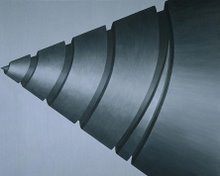
Mat i syn, 1997
[Mother and Son]
Mother and Son opens with a languorously sublime image of a man and a woman; their physical forms distorted through an anamorphic lens. A son (Alexei Anashinov) attends to his terminally ill mother (Gudrun Geyer) at a remote house in the Russian countryside. He whispers to her, combs her hair, talks her through an asphyxiating attack. When she wishes to be taken outdoors, he dutifully cradles her in his arms and carries her to the open fields. He takes her to a nearby bench and reads an old postcard to her. He asks about the identity of the author, and her response is vague. He does not probe for more information, but accepts the comfortable silence - perhaps, because he already understands her, and elaboration is moot. After taking a brief nap, he carries her to a wooded area where she can rest against a tree and absorb the beauty of nature. And it is a wondrous sight to behold. The characters linger in the hypnotic, mesmerizing images of the dynamic landscape. After touring the countryside, they return home. She expresses her fear of dying, and he responds that death, like life, has no transcendental meaning. After his mother falls asleep, he ventures into the countryside alone, and grieves under the weight of tragic inevitability.
Beyond the pervasive silence of precise language and profound symbiotic connection lie the ethereal, intoxicating images that populate the spare, atmospheric canvas of Aleksandr Sokurov's Mother and Son. The stark, impressionistic landscape, intensely reminiscent of German Romanticism, echoes the natural scenes of Werner Herzog, and serves as a metaphor for the turmoil of the soul. The turbulent skies swirl, the blades of grass bend with the wind, the leaves rustle, the landscape colors shift and transform. Similar to the films of Ingmar Bergman and Andrei Tarkovsky, minimal dialogue and extended silence pervade the film. In essence, despite the son's consuming attention and sympathetic understanding for his beloved mother, death remains as a personal, and inherently, isolating experience for both the victim and the survivor. On two occasions, a train traverses the landscape from a distance. It is a fleeting glimpse of the world outside their devoted intimacy. It is a reflection of their own journey through the enigmatic terrain of life and death, suffering and loss - first, together, then apart. It is their personal journey.
© Acquarello 2000. All rights reserved.





No comments:
Post a Comment